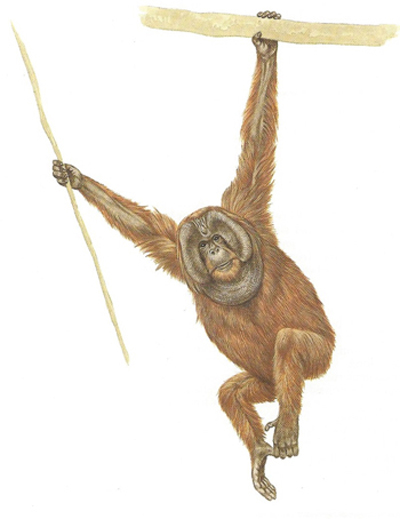ped-, pedi-, -pedal, -ped, -pede, -pedia
(Latin: foot, feet; people often see this ped element in other words. When people refer to "pedal extremities", they mean "feet". When anyone pushes the pedals of a bicycle, it is done with the feet. A pedestrian must use the feet for walking. A quadruped has four feet while a centipede has "100 feet"; or a large number of them because it may be impossible to count all of them.)
pediform
Having the form of a foot: said chiefly of the organs of insects.
pedigerous
Bearing feet or legs; having feet.
pedigree
1. A conventional mark consisting of three curved lines, which bears a distinct resemblance to the claws of a bird; specifically, a crane.
2. A genealogical stemma or table; a genealogy drawn up or exhibited in some tabular form.
3. One’s line of ancestors; an ancestral line; ancestry; lineage, descent.
4. Etymologically, pedigree means “crane’s foot”. The idea behind the metaphor is that a bird’s foot, with its three splayed-out toes, resembles the branching lines drawn to illustrate a family tree or pedigree.
2. A genealogical stemma or table; a genealogy drawn up or exhibited in some tabular form.
3. One’s line of ancestors; an ancestral line; ancestry; lineage, descent.
4. Etymologically, pedigree means “crane’s foot”. The idea behind the metaphor is that a bird’s foot, with its three splayed-out toes, resembles the branching lines drawn to illustrate a family tree or pedigree.
pediluvial, pediluvium
Of or pertaining to the washing of feet, or to a foot-bath; ceremonies connected with the washing of feet (as a religious act).
A foot bath or the cleansing of feet: Jane's mother went to a podiatrist several times to have a series of pediluvia to treat her feet because of the pain that made it almost impossible for her to walk.
Some Christian organizations use the pediluvium as a religious rite as indicated in the book of John 13:1-17 of the Bible.
pedimanous (adjective), more pedimanous, most pedimanous
Having all four feet resembling hands; including various species of monkeys, lemurs, and opossums: In Tim’s biology class, he learned that there were pedimanous animals that have the front and back paws functioning just as if they were hands.


In geology, a broad, gently sloping, low-relief erosion surface: A pediment is composed primarily of bare rock that develops in an arid or semiarid region at the base of a receding mountain slope.
pediphalanx
A phalanx (bones of the fingers or toes) of a digit of the foot.
peditis
Pedal osteitis (inflammation of a bone in a foot or the feet).
pedobarograph
An apparatus for recording dynamic variations in downward pressure by different areas of the sole of a foot as a person stands upright or walks.
pedobarography
Measurement of dynamic variations in downward pressure by different areas of the sole of a foot, using a pedobarograph.
pedodynamometer
An instrument for measuring the strength of the leg and muscles.
The term pedodynamometer comes from Latin pes-, ped-, "foot" + Greek dynamis, "force" + Greek metron, "measure".
pedogram
A record made by a pedograph (an instrument for recording and studying gait or walk).
pedograph
1. An instrument for recording and studying the gait.
2. An imprint on paper of the weight-bearing surface of the foot, surrounded by a pencil-marked contour of the upper foot.
2. An imprint on paper of the weight-bearing surface of the foot, surrounded by a pencil-marked contour of the upper foot.
Divination by observing and analyzing the soles or bottoms of feet: Pedomancy can be interpreted in terms of lines and mounts of a foot, exactly as in cheiromancy or palmistry, but to a greatly limited degree.
This mode of divination is of great antiquity in the Orient, particularly among the Chinese.
Keep in mind that all of the ped words which you see in English are not always from the Latin "foot" or "feet". There are also some Greek ped words in English which do not mean "foot"! So, don't confuse this Latin element with a Greek pedo- that means "child" or the Greek pedo- which means "ground, soil".
If you want to leave footprints in the sands of time, don’t drag your feet.


